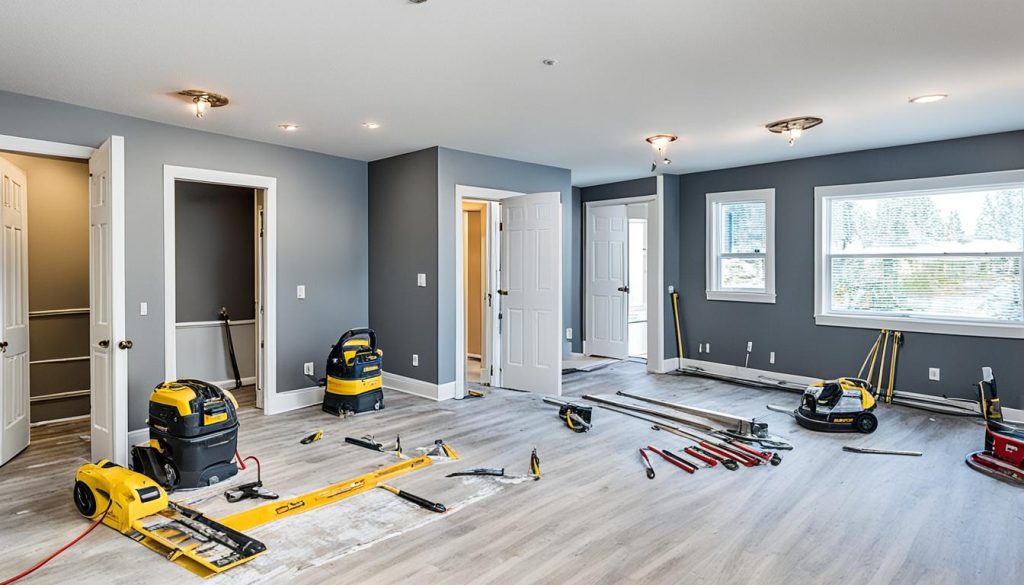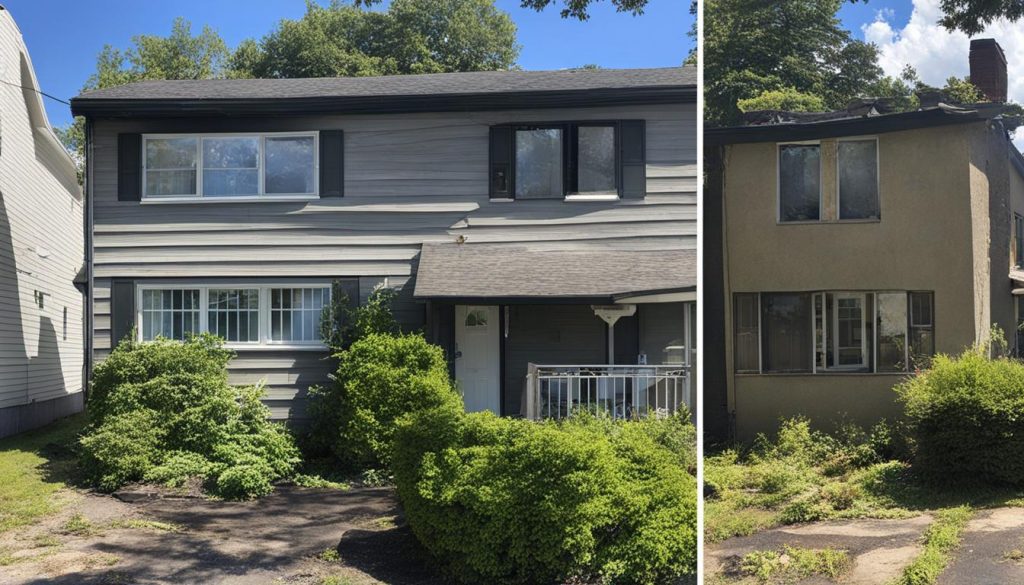This staggering statistic shows the significant number of individuals and families who choose to live in rented homes. For both landlords and tenants, maintaining and improving the quality of rental properties is essential. Renovations can not only enhance the value and appeal of a rental property but also provide a better living experience for tenants.
However, before diving into a renovation project, it’s important to understand the rights and responsibilities that come with renovating a rental home. From obtaining landlord permission to complying with local regulations, there are several considerations to keep in mind.
Key Takeaways:
- Renovations can improve the value and appeal of a rental property.
- Both landlords and tenants have rights and responsibilities when it comes to renovating a rental home.
- Familiarize yourself with local regulations and obtain necessary permits before starting any renovations.
- Communicate with tenants about the renovations to ensure their comfort and safety.
- Select reputable contractors and professionals for a successful renovation process.
Considerations Before Renovating a Rental Property
Before embarking on a renovation project for your rental property, it’s crucial to consider several key factors. Firstly, take into account the impact the renovations will have on your current tenants, especially if the property is currently occupied. Open and transparent communication with your tenants is vital to ensure their comfort and safety throughout the renovation process.
Next, determine the scope and budget of your renovation project. It’s important to prioritize upgrades that will provide the highest return on investment. At the same time, consider the renovation rights and regulations specific to renters in your province. Familiarize yourself with local building codes, permits, and approval processes to ensure compliance at every stage.
Timing is another critical aspect to consider. Aim to schedule the renovations in a way that minimizes inconvenience to your tenants. Taking their preferences and needs into account will not only maintain a good landlord-tenant relationship but also potentially attract higher-quality renters in the future.
Lastly, choosing reputable contractors and professionals is essential to ensure a smooth and successful renovation. Research and select experienced and licensed individuals or companies who can deliver the quality and craftsmanship you desire.
By carefully considering these factors, you can navigate the renovation process while respecting the rights and needs of your tenants, and ultimately enhance the value and appeal of your rental property.
Best Renovations for Improving a Rental Property
When it comes to renovating a rental property, choosing the right renovations can make a significant impact on both the value and appeal of the property. Here are some tips for renovating a rental property to attract potential tenants and maximize your return on investment:
- Upgrade the Kitchen: The kitchen is often considered the heart of a home and can be a major selling point for potential tenants. Consider updating appliances, countertops, and cabinetry to create a modern and functional space.
- Refresh with Paint and Flooring: A fresh coat of paint and updated flooring can instantly transform the look of a rental property. Choose neutral colors that appeal to a wide range of renters and opt for durable flooring options that can withstand heavy foot traffic.
- Remodel the Bathroom: Another area that can greatly improve the value and desirability of a rental property is the bathroom. Consider installing modern fixtures, stylish tiles, and vanities to create a spa-like retreat for tenants.
- Focus on Energy Efficiency: Install energy-efficient upgrades such as appliances, windows, and insulation. Not only will this help reduce utility costs for both the landlord and the tenant, but it will also attract environmentally conscious renters.
- Enhance Curb Appeal: First impressions matter, so don’t neglect the exterior of your rental property. Consider landscaping improvements, such as planting flowers or adding decorative elements, to enhance curb appeal and make a lasting impression on potential tenants.
- Integrate Smart Home Technology: Modern renters appreciate smart home features that offer convenience and security. Consider installing smart thermostats, door locks, or security systems to add value to your rental property.
- Add Storage Space: Adequate storage is always a plus for tenants. Consider adding built-in shelves or closets to maximize space and provide tenants with ample storage options.
By focusing on these key areas of renovation, you can create a rental property that stands out from the competition, attract higher-quality tenants, and maximize your rental income.
Top Renovations for Improving a Rental Property
| Renovation | Benefits |
|---|---|
| Kitchen Upgrade | Attracts high-quality tenants |
| Paint and Flooring | Instantly revitalizes the property’s appearance |
| Bathroom Remodel | Enhances overall value and desirability |
| Energy-Efficient Upgrades | Reduces utility costs, appeals to environmentally conscious renters |
| Curb Appeal Enhancements | Makes a positive first impression on potential tenants |
| Smart Home Technology Integration | Offers convenience and security for modern renters |
| Additional Storage Space | Provides tenants with ample storage options |
Rules for Renovating a Rental Property in British Columbia
When it comes to renovating a rental property in British Columbia, there are certain rules and guidelines that landlords must follow. These regulations are in place to protect the rights and safety of both tenants and landlords. Whether you’re planning minor repairs or extensive renovations, it’s important to be aware of these rules before starting any renovation project.
Minor renovations and repairs can usually be carried out without major interruption to existing tenants. As a landlord, you have the authority to make necessary repairs and improvements to maintain the property’s habitability. However, it’s crucial to give tenants 24 hours’ written notice before entering their unit for any non-emergency repairs or inspections. This allows them to prepare and be aware of any disruptions to their daily routines.
For more extensive renovations that require vacant possession of the rental unit, landlords are required to give notice to end the tenancy. This means that if you plan on conducting renovations that will displace the current tenants, you’ll need to apply for this and go through a dispute resolution hearing. The purpose of this hearing is to determine if the renovations are substantial enough to require the tenancy to end.
If the dispute resolution hearing approves the renovations and the tenancy is scheduled to end, tenants must be given 4 months to vacate the rental unit. This gives them sufficient time to find alternative housing and make necessary arrangements. It’s important to respect this timeline and provide support to tenants during the transition process.
As a landlord, it’s crucial to familiarize yourself with the local building codes, permits, and approvals required for substantial renovations. Ensuring that you comply with these regulations not only protects your tenants but also safeguards the value and integrity of your property.
Additionally, it’s essential to consider the impact of renovations on essential services and the safety of the rental unit. If the renovations result in the loss of an essential service or make the unit unsafe for habitation, you may be obligated to provide compensation to tenants for the inconvenience and potential disruption to their living conditions.
By following these rules and guidelines, you can navigate the process of renovating a rental property in British Columbia effectively and responsibly. Prioritizing tenant rights and safety will help maintain positive landlord-tenant relationships and ensure the long-term success of your rental property.

Renovating a Rental Property in Ontario
When it comes to renovating a rental property in Ontario, there are specific guidelines that landlords must follow. Whether you’re considering minor repairs or major renovations, it’s important to be aware of your rights and obligations as a landlord.
For minor renovations and repairs that do not require tenants to vacate the premises, landlords are typically not required to evict tenants before beginning the work. However, landlords must provide tenants with 24 hours’ written notice before entering the unit for any repairs or renovations.
On the other hand, for large-scale renovations that may require tenants to temporarily move out, landlords must apply to the Landlord Tenant Board (LTB) for approval to evict tenants. This involves attending a hearing where the landlord must demonstrate the need for the renovations, while tenants have the opportunity to present their case. It’s essential to go through the proper legal channels and obtain approval from the LTB before proceeding with any evictions for renovations.
During this process, it’s important to note that tenants may have the right of first refusal. This means that once the renovations are complete, tenants may have the option to move back into the unit. Providing tenants with this option can help maintain a positive tenant-landlord relationship and minimize the disruption caused by the renovation process.
Additionally, landlords must provide compensation to tenants who are evicted due to renovations. The amount of compensation varies based on the number of residential units in the complex. Ensuring fair compensation for tenants is not only a legal requirement but also demonstrates a commitment to treating tenants fairly and respectfully.
Overall, as a landlord in Ontario, it’s crucial to familiarize yourself with the renovation rules and guidelines outlined by the Landlord Tenant Board. By following these rules and considering the rights and needs of your tenants, you can navigate the renovation process successfully and maintain a positive relationship with your tenants.

| Renovation Guidelines in Ontario | Minor Renovations | Major Renovations |
|---|---|---|
| Eviction Requirement | No eviction required | Approval from LTB and possible eviction |
| Tenant Notice | 24 hours’ written notice | Approval from LTB and possible eviction |
| Tenant Right of Refusal | N/A | Option to move back in after renovations |
| Tenant Compensation | N/A | Compensation based on number of residential units |
Legal Process and Protections for Tenants in Renovictions
Renovictions, a term referring to evictions for renovations followed by re-renting the unit at a higher rate, have raised concerns among tenants in recent years. In Canada, provincial rental laws provide certain protections for tenants in such situations. Landlords must adhere to a prescribed legal process and give proper notice to tenants before initiating an eviction for renovations.
Tenants facing renovictions have the right of first refusal, meaning they have the option to move back into the unit once the renovations are complete. If a tenant believes they were unjustifiably evicted or that the landlord did not follow the correct legal procedure, they can file a complaint with the Landlord Tenant Board (LTB).
The LTB has the authority to grant relief from eviction or delay the eviction based on the circumstances of the case. It is crucial for tenants to be aware of their rights in renoviction situations and to seek legal assistance if they suspect the eviction process is not being handled correctly.

Leave a Reply
You must be logged in to post a comment.